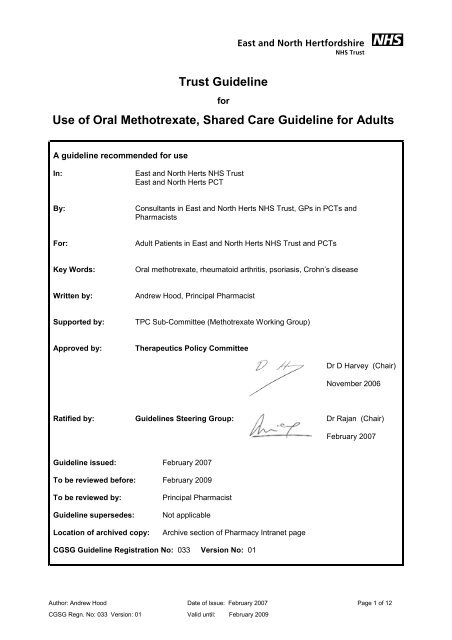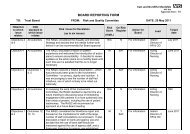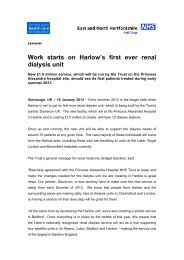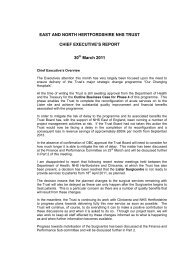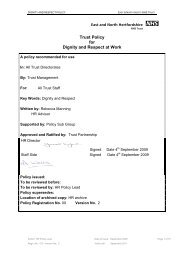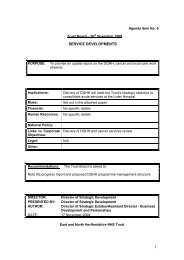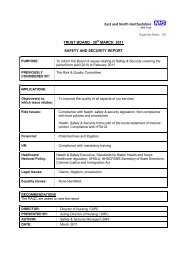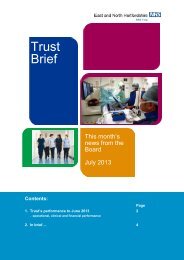Use of Oral Methotrexate, Shared Care Guideline for Adults
Use of Oral Methotrexate, Shared Care Guideline for Adults
Use of Oral Methotrexate, Shared Care Guideline for Adults
Create successful ePaper yourself
Turn your PDF publications into a flip-book with our unique Google optimized e-Paper software.
Trust <strong>Guideline</strong><br />
<strong>for</strong><br />
abc<br />
<strong>Use</strong> <strong>of</strong> <strong>Oral</strong> <strong>Methotrexate</strong>, <strong>Shared</strong> <strong>Care</strong> <strong>Guideline</strong> <strong>for</strong> <strong>Adults</strong><br />
A guideline recommended <strong>for</strong> use<br />
In:<br />
East and North Herts NHS Trust<br />
East and North Herts PCT<br />
By:<br />
Consultants in East and North Herts NHS Trust, GPs in PCTs and<br />
Pharmacists<br />
For:<br />
Adult Patients in East and North Herts NHS Trust and PCTs<br />
Key Words:<br />
<strong>Oral</strong> methotrexate, rheumatoid arthritis, psoriasis, Crohn’s disease<br />
Written by:<br />
Andrew Hood, Principal Pharmacist<br />
Supported by:<br />
TPC Sub-Committee (<strong>Methotrexate</strong> Working Group)<br />
Approved by:<br />
Therapeutics Policy Committee<br />
Dr D Harvey (Chair)<br />
November 2006<br />
Ratified by: <strong>Guideline</strong>s Steering Group: Dr Rajan (Chair)<br />
February 2007<br />
<strong>Guideline</strong> issued: February 2007<br />
To be reviewed be<strong>for</strong>e: February 2009<br />
To be reviewed by:<br />
<strong>Guideline</strong> supersedes:<br />
Location <strong>of</strong> archived copy:<br />
Principal Pharmacist<br />
Not applicable<br />
Archive section <strong>of</strong> Pharmacy Intranet page<br />
CGSG <strong>Guideline</strong> Registration No: 033 Version No: 01<br />
Author: Andrew Hood Date <strong>of</strong> Issue: February 2007 Page 1 <strong>of</strong> 12<br />
CGSG Regn. No: 033 Version: 01 Valid until: February 2009
USE OF ORAL METHOTREXATE, SHARED CARE GUIDELINE FOR ADULTS<br />
East & North Herts NHS Trust<br />
Index<br />
Section<br />
Page Number<br />
Part One – <strong>Shared</strong> <strong>Care</strong> Responsibilities<br />
1. Hospital Specialist Responsibilities 3<br />
2. General Practitioner Responsibilities 4<br />
3. Patient’s Role 4<br />
4. Contact Numbers 5<br />
Part Two – Supporting In<strong>for</strong>mation<br />
1. Background 6<br />
2. Indication 7<br />
3. Dosage and Administration 7<br />
4. Prescribing Principles 8<br />
5. Contra-indications 8<br />
6. Monitoring 8<br />
Monitoring rheumatoid arthritis and related<br />
inflammatory conditions<br />
9<br />
Monitoring psoriasis 9<br />
Monitoring Crohn’s disease 9<br />
7. What To Do If Side Effects Occur 10<br />
8. Main Side Effects 10<br />
9. Drug Interactions 11<br />
10. Cost 12<br />
11. References 12<br />
Author: Andrew Hood Date <strong>of</strong> Issue: February 2007 Page 2 <strong>of</strong> 12<br />
CGSG Regn. No: 033 Version: 01 Valid until: February 2009
USE OF ORAL METHOTREXATE, SHARED CARE GUIDELINE FOR ADULTS<br />
East & North Herts NHS Trust<br />
FOR REFERENCE:<br />
ORAL METHOTREXATE, SHARED CARE GUIDELINE FOR ADULTS<br />
PART ONE – SHARED CARE RESPONSIBILITIES <strong>of</strong> SPECIALIST, GP and PATIENT<br />
<strong>for</strong> USE <strong>of</strong> ORAL METHOTREXATE<br />
1. Hospital Specialist Responsibilities (4,5,13)<br />
<br />
<br />
<br />
<br />
<br />
<br />
<br />
<br />
<br />
<br />
<br />
<br />
<br />
<br />
<br />
<br />
Confirm diagnosis and indication <strong>for</strong> drug treatment<br />
Discuss the potential benefits and side effects <strong>of</strong> treatment with the patient. Ensure that the<br />
patient understands dosing is at weekly intervals<br />
Provide patient with a patient in<strong>for</strong>mation leaflet prior to treatment<br />
ONLY 2.5mg tablets will be prescribed and the frequency <strong>of</strong> administration i.e. weekly will be<br />
clearly stated on the prescription. <strong>Use</strong> <strong>of</strong> phrases such as 'as directed' must be avoided<br />
Carry out baseline monitoring requirements and initiate and stabilise methotrexate therapy<br />
Ask the GP whether he or she is willing to participate in shared care, and agree with the GP as<br />
to who will discuss the shared care arrangement with the patient<br />
To issue NPSA blood monitoring booklets <strong>for</strong> patients commencing oral methotrexate<br />
Provide GP with results <strong>of</strong> baseline tests<br />
Clarify with the GP who is to take responsibility <strong>for</strong> monitoring and recommend frequency <strong>of</strong><br />
monitoring if GP is to carry this out. Whoever takes responsibility <strong>for</strong> monitoring must act<br />
upon the results.<br />
Recommend dose and timing <strong>of</strong> any concomitant folic acid<br />
Monitor patient's response to therapy and communicate promptly to the GP when treatment is<br />
changed<br />
Monitor the patient <strong>for</strong> any side- effects to the methotrexate therapy and in<strong>for</strong>m the GP if any<br />
occur<br />
Advise the GP on when to adjust the dose, stop treatment or consult with specialist<br />
Be available to give advice to GP and ensure that clear backup arrangements exist <strong>for</strong> GPs to<br />
obtain advice and support<br />
Decide when to stop therapy<br />
Report adverse events to the CSM and GP<br />
Author: Andrew Hood Date <strong>of</strong> Issue: February 2007 Page 3 <strong>of</strong> 12<br />
CGSG Regn. No: 033 Version: 01 Valid until: February 2009
USE OF ORAL METHOTREXATE, SHARED CARE GUIDELINE FOR ADULTS<br />
East & North Herts NHS Trust<br />
2. General Practitioner Responsibilities (4,5,13)<br />
<br />
<br />
<br />
<br />
<br />
<br />
<br />
<br />
<br />
<br />
<br />
<br />
<br />
<br />
Reply to the request <strong>for</strong> shared care as soon as possible<br />
Prescribe methotrexate as recommended by hospital specialist<br />
Only 2.5mg tablets will be prescribed and the frequency <strong>of</strong> administration i.e. weekly will be<br />
clearly stated on the prescription. <strong>Use</strong> <strong>of</strong> phrases such as 'as directed' must be avoided.<br />
Receive copies <strong>of</strong> any blood test results carried out in secondary care <strong>for</strong> in<strong>for</strong>mation<br />
Clarify with the hospital specialist who is to take responsibility <strong>for</strong> blood tests and monitoring.<br />
Whoever takes responsibility <strong>for</strong> monitoring must act upon the results.<br />
Blood tests may be carried out by the GP by negotiation at recommended frequencies. Copies<br />
<strong>of</strong> blood results will be sent to the specialist. Refer to specialist if results abnormal. Where<br />
GPs accept responsibility <strong>for</strong> monitoring this will be recognised under NES (national enhanced<br />
service)<br />
To complete NPSA oral methotrexate monitoring booklet<br />
Ensure methotrexate is included on the electronic patient record in order to minimise the<br />
chances <strong>of</strong> prescribing other drugs that would interact with methotrexate<br />
Ensure that the patient understands that dosing is at weekly intervals, and which warning<br />
symptoms to report<br />
Ensure compatibility with concomitant medication<br />
Monitor the patient <strong>for</strong> any side-effects to methotrexate therapy and refer back to specialist<br />
should any serious side effect occur<br />
Adjust the dose as advised by the specialist<br />
Stop treatment on the advice <strong>of</strong> the specialist or immediately if an urgent need to stop<br />
treatment arises<br />
Report adverse events to the specialist and CSM<br />
3. Patient's role (13)<br />
<br />
<br />
<br />
<br />
<br />
<br />
<br />
<br />
Written in<strong>for</strong>mation will be provided at the first visit<br />
Take the methotrexate as prescribed<br />
Report to the specialist or GP if he or she does not have a clear understanding <strong>of</strong> the<br />
treatment<br />
Share any concerns in relation to treatment with methotrexate.<br />
In<strong>for</strong>m specialist or GP <strong>of</strong> any other medication being taken, including over-the-counter<br />
products.<br />
Report any adverse effects or warning symptoms to the specialist or GP whilst taking<br />
methotrexate<br />
In<strong>for</strong>m the pharmacist that she/he is on methotrexate be<strong>for</strong>e purchasing any over-the-counter<br />
medication<br />
To carry NPSA oral methotrexate monitoring booklet and ensure it is updated following blood<br />
test<br />
Author: Andrew Hood Date <strong>of</strong> Issue: February 2007 Page 4 <strong>of</strong> 12<br />
CGSG Regn. No: 033 Version: 01 Valid until: February 2009
USE OF ORAL METHOTREXATE, SHARED CARE GUIDELINE FOR ADULTS<br />
East & North Herts NHS Trust<br />
4. Contact Numbers<br />
Specialist Designation Contact number<br />
Dr Binder Consultant Rheumatologist 01438 314333 ext 4128<br />
Dr Axon Consultant Rheumatologist 01707 328111 ext 4186<br />
Dr Ellis Consultant Rheumatologist 01438 314333 ext 4473<br />
Fidelma Gordon Rheumatology Nurse Specialist 01438 314333 ext 5624<br />
Sharon Lerpiniere Rheumatology Nurse Specialist 01438 314333 ext 5624<br />
Dr Ogden Associate Specialist 01438 314333 ext 4129<br />
Dr O'Doherty Consultant Dermatologist 01707 328111 ext 3012<br />
Dr Bayoumi Consultant Dermatologist 01707 328111 ext 3012<br />
Dr Mazzon Consultant Dermatologist 01707 328111 ext 3012<br />
Dr McIntyre Consultant Gastroenterologist 01707 365441<br />
Dr Greenfield Consultant Gastroenterologist 01707 365086<br />
Dr Morris Consultant Gastroenterologist 01707 365550<br />
Dr Sargeant Consultant Gastroenterologist 01438 314333 ext 4245<br />
Dr Rowlands Consultant Gastroenterologist 01707 365086<br />
Dr Carter Consultant Gastroenterologist 01707 365441<br />
Tracey Lewis<br />
Deborah Morris<br />
Inflammatory Bowel Disease<br />
Nurse Specialist<br />
Inflammatory Bowel Disease<br />
Nurse Specialist<br />
01707 365588<br />
01438 781680<br />
Author: Andrew Hood Date <strong>of</strong> Issue: February 2007 Page 5 <strong>of</strong> 12<br />
CGSG Regn. No: 033 Version: 01 Valid until: February 2009
USE OF ORAL METHOTREXATE, SHARED CARE GUIDELINE FOR ADULTS<br />
East & North Herts NHS Trust<br />
PART TWO – SUPPORTING INFORMATION<br />
1. Background (1)<br />
Rheumatoid Arthritis<br />
Rheumatoid arthritis (RA) is the most common chronic inflammatory joint disease affecting 0.5 to<br />
1% <strong>of</strong> the population. It is believed that RA is triggered by exposure <strong>of</strong> an immunogenetically<br />
susceptible host to an arthritogenic antigen. A continuing auto-immune reaction ultimately leads to<br />
joint destruction.<br />
The present aim <strong>of</strong> treatment is to control joint inflammation as early as possible after diagnosis.<br />
This should lead to pain reduction and maintain the range <strong>of</strong> joint movement, minimise loss <strong>of</strong><br />
function, prevent de<strong>for</strong>mity and keep patients mobile and independent. Several factors have<br />
influenced the change in practice, which advocates the earlier use <strong>of</strong> disease modifying<br />
antirheumatic drugs (DMARDs). The rate <strong>of</strong> occurrence <strong>of</strong> bony erosions is greatest during the first<br />
two years <strong>of</strong> RA and there is evidence that earlier use <strong>of</strong> DMARDs slows radiological progression<br />
and improves function. The toxicity <strong>of</strong> DMARDs is similar to NSAIDs, particularly during the early<br />
stages <strong>of</strong> RA when patients’ general health is good and newer DMARDs e.g. methotrexate, are<br />
less toxic and more effective than those previously available.<br />
<strong>Methotrexate</strong> is also used <strong>for</strong> Systemic Lupus Erythematosus (SLE), ankylosing spondylitis,<br />
juvenile chronic arthritis, dermatomyositis and psoriatic arthritis.<br />
Psoriasis<br />
Psoriasis affects 1-2% <strong>of</strong> people in the UK. Psoriasis is a chronic cutaneous inflammatory disease<br />
characterised by hyperproliferation <strong>of</strong> keratinocytes and infiltration <strong>of</strong> activated T lymphocytes into<br />
the epidermis. The most common <strong>for</strong>m <strong>of</strong> psoriasis is the chronic plaque type (psoriasis vulgaris).<br />
Less common <strong>for</strong>ms include pustular, inverse, erythrodermic, and guttate.<br />
Treatment is suppressive, aimed at inducing a remission or making the amount <strong>of</strong> psoriasis<br />
tolerable to the patient. For the majority <strong>of</strong> patients, the disease follows a chronic course,<br />
interspersed with periods <strong>of</strong> remission.<br />
Although topical treatment is sufficient <strong>for</strong> many patients, approximately 20% need additional<br />
systemic drugs (including methotrexate, ciclosporin, acitretin, azathioprine, hydroxyurea<br />
(hydroxycarbamide), PUVA). Indications <strong>for</strong> systemic therapy include:<br />
<br />
<br />
<br />
<br />
<br />
Failure <strong>of</strong> adequate trial <strong>of</strong> topical therapy<br />
Repeated hospital admissions <strong>for</strong> topical therapy<br />
Extensive chronic plaque psoriasis in the elderly or infirm<br />
Generalised pustular or erythrodermis psoriasis<br />
Severe psoriatic arthropathy<br />
Author: Andrew Hood Date <strong>of</strong> Issue: February 2007 Page 6 <strong>of</strong> 12<br />
CGSG Regn. No: 033 Version: 01 Valid until: February 2009
USE OF ORAL METHOTREXATE, SHARED CARE GUIDELINE FOR ADULTS<br />
East & North Herts NHS Trust<br />
Crohn's disease (13,14,15)<br />
<strong>Methotrexate</strong> is used to treat chronically active Crohn's disease. It is usually used <strong>for</strong> patients who<br />
have tried other treatments unsuccessfully. It is used to reduce the amount <strong>of</strong> steroids the patient<br />
has to take whilst keeping symptoms under control.<br />
<strong>Methotrexate</strong> reduces inflammation in the bowel by dampening down the immune response.<br />
<strong>Methotrexate</strong> is given by intramuscular injection once a week on the same day each week <strong>for</strong> 16<br />
weeks. Once remission has been achieved and the patient has completed a 16-week course <strong>of</strong><br />
intramuscular methotrexate they will be reviewed in the Gastroenterology clinic by the<br />
Gastroenterologist and Clinical Nurse specialist, to discuss treatment response, side effects and<br />
possible continuation <strong>of</strong> methotrexate on a reduced dose <strong>of</strong> oral methotrexate.<br />
Medical review will be done 6 monthly once the patient is on oral methotrexate.<br />
2. Indication (2)<br />
<strong>Methotrexate</strong> is a disease modifying agent that is being used to induce and maintain remission in<br />
rheumatoid arthritis.<br />
It is also indicated <strong>for</strong> severe uncontrolled psoriasis unresponsive to conventional therapy.<br />
<strong>Methotrexate</strong> is also used to treat chronically active Crohn's disease<br />
3. Dosage and Administration (2,3)<br />
NB <strong>Methotrexate</strong> is taken once a week, on the same day each week<br />
Rheumatoid arthritis and related inflammatory conditions<br />
Start at 2.5mg once a week <strong>for</strong> week 1<br />
5mg once a week <strong>for</strong> week 2<br />
7.5mg once a week from week 3 onwards<br />
Dosage will be reviewed at the Rheumatalogy out-patients appointment after 2-3 months<br />
MAINTENANCE DOSE 7.5 – 20mg once a week, according to advice<br />
Psoriasis<br />
Initial test dose <strong>of</strong> 5 – 7.5mg once a week <strong>for</strong> weeks 1 and 2<br />
Week 3 – blood test is done, no methotrexate is given in this week<br />
Week 4 – maintenance dose is decided, usually 10 – 20 mg once a week<br />
Crohn's disease (13,14,15)<br />
15mg once a week, after completing the 16 week course <strong>of</strong> intramuscular methotrexate.<br />
NB For all the above conditions:<br />
Response may take 3 – 12 weeks. Lower doses should be used in the frail, elderly or if there is<br />
renal impairment.<br />
PRESCRIPTIONS <strong>of</strong> 2.5mg TABLETS ONLY SHOULD BE ISSUED<br />
Author: Andrew Hood Date <strong>of</strong> Issue: February 2007 Page 7 <strong>of</strong> 12<br />
CGSG Regn. No: 033 Version: 01 Valid until: February 2009
USE OF ORAL METHOTREXATE, SHARED CARE GUIDELINE FOR ADULTS<br />
East & North Herts NHS Trust<br />
4. Prescribing Principles (4,5)<br />
All communication (ie letters, patient held monitoring and dosage records), discharge prescriptions<br />
and FP10s should normally carry the following details:<br />
<br />
<br />
<br />
<br />
Weekly dose (methotrexate always taken once a week)<br />
Day <strong>of</strong> the week dose taken (always same day <strong>of</strong> the week)<br />
Usual strength <strong>of</strong> tablets the patient takes (eg if patient takes 10mg per week on Mondays<br />
as four 2.5mg tablets, this should be clearly indicated on the prescription.)<br />
Folic acid should be prescribed as follows:<br />
<br />
<br />
<br />
Rheumatoid arthritis – 10mg once weekly, two to three days be<strong>for</strong>e the methotrexate is<br />
taken.<br />
Psoriasis – 5mg on five days <strong>of</strong> the week, to start on the day after the methotrexate is<br />
taken.<br />
Crohn's disease – 5mg three days per week.<br />
NB FOLIC ACID MUST NEVER BE TAKEN ON THE SAME DAY<br />
AS THE METHOTREXATE<br />
5. Contra-indications (3)<br />
Pr<strong>of</strong>ound impairment <strong>of</strong> renal or hepatic function or haematological impairment. Liver disease,<br />
active infectious disease, serious cases <strong>of</strong> anaemia, unexplained leucopenia or thrombocytopenia,<br />
immunodeficiency syndrome(s), hepatitis C, large doses <strong>of</strong> ultraviolet light, pregnancy and breastfeeding.<br />
Patients with known allergy to <strong>Methotrexate</strong>. Concomitant administration <strong>of</strong> folate<br />
antagonists e.g. Co-trimoxazole. High alcohol intake.<br />
6. Monitoring (11)<br />
Baseline investigations – to be carried out in secondary care by specialist consultant<br />
Monitoring – normally to be carried out in secondary care by specialist consultant.<br />
GPs may undertake blood test monitoring, by negotiation, at recommended frequencies and refer<br />
if abnormal, and ensure that the specialist consultant receives copies <strong>of</strong> the results<br />
NB Blood tests should be taken on the day be<strong>for</strong>e methotrexate is taken –<br />
NEVER on the day <strong>of</strong> methotrexate.<br />
Author: Andrew Hood Date <strong>of</strong> Issue: February 2007 Page 8 <strong>of</strong> 12<br />
CGSG Regn. No: 033 Version: 01 Valid until: February 2009
USE OF ORAL METHOTREXATE, SHARED CARE GUIDELINE FOR ADULTS<br />
East & North Herts NHS Trust<br />
Monitoring details:<br />
Rheumatoid arthritis and related inflammatory conditions<br />
FBC<br />
LFTs<br />
ESR/CRP<br />
U&Es<br />
Chest X ray<br />
MSU<br />
Baseline,<br />
<strong>for</strong>tnightly until 4 weeks after the last dose increase<br />
and then 6 weekly after 2 – 3 months<br />
Baseline,<br />
<strong>for</strong>tnightly until 4 weeks after the last dose increase<br />
and 6 weekly after 2 – 3 months<br />
Every 2 – 3 months<br />
Baseline and then 6 – 12 monthly<br />
Baseline<br />
Baseline<br />
Psoriasis<br />
FBC<br />
LFTs<br />
U&Es<br />
Chest X ray<br />
Urinalysis<br />
PIIINP<br />
HEP C ANTIBODIES<br />
HELICOBACTER ANTIBODIES<br />
Baseline at week 3<br />
and then <strong>for</strong>tnightly <strong>for</strong> 2 – 3 months,<br />
then 3 monthly once treatment established.<br />
Baseline at week 3<br />
and then <strong>for</strong>tnightly <strong>for</strong> 2 – 3 months,<br />
then 3 monthly once treatment established.<br />
Baseline<br />
Baseline<br />
Baseline<br />
Checked every 3 months<br />
Baseline<br />
Baseline<br />
Crohn's disease (13,14,15)<br />
A baseline test <strong>for</strong> FBC, U&Es, LFTs, red cell folate, ESR and CRP and possibly chest X-ray are<br />
all done prior to commencing IM methotrexate, and then weekly <strong>for</strong> first 4 weeks and then monthly<br />
thereafter.<br />
For oral methotrexate:<br />
FBC<br />
U&Es<br />
LFTs<br />
Red cell folate<br />
CRP/ESR<br />
Baseline – then monthly<br />
Baseline – then monthly<br />
Baseline – then monthly<br />
Baseline<br />
Baseline – then monthly<br />
Author: Andrew Hood Date <strong>of</strong> Issue: February 2007 Page 9 <strong>of</strong> 12<br />
CGSG Regn. No: 033 Version: 01 Valid until: February 2009
USE OF ORAL METHOTREXATE, SHARED CARE GUIDELINE FOR ADULTS<br />
East & North Herts NHS Trust<br />
7. What To Do If Side Effects Occur:<br />
<br />
Adding folic acid at the doses recommended above may help nausea, anorexia, abdominal<br />
discom<strong>for</strong>t and diarrhoea. Avoid on the day methotrexate is taken.<br />
STOP METHOTREXATE and DISCUSS with HOSPITAL SPECIALIST IF:<br />
WBC < 4.0 X 10 9 /L<br />
NEUTROPHILS twice upper limit <strong>of</strong> normal reference range<br />
Unexplained fall in albumin<br />
Rash or oral ulceration- sore mouth<br />
New or increasing dyspnoea or cough<br />
Any impairment <strong>of</strong> renal function<br />
Stomatitis (first indication <strong>of</strong> GI toxicity)<br />
Fever<br />
Sweating<br />
MCV >105fl- investigate and if B12 or folate low, start appropriate supplementation.<br />
Abnormal bruising or sore throat- withhold until FBC result is available.<br />
8. Main Side Effects (2,3,4,6,7,8)<br />
1. Common<br />
Nausea, anorexia, oral ulceration, minor hair thinning, leucopenia, abdominal discom<strong>for</strong>t,<br />
diarrhoea, headaches. In patients who experience gastro-intestinal side effects with<br />
methotrexate, folic acid may help to reduce the frequency <strong>of</strong> such side effects. The BNF<br />
recommendation is 5mg <strong>of</strong> folic acid weekly, however in practice the recommendation relating<br />
to number <strong>of</strong> days/ week folic acid treatment varies from specialist to specialist.<br />
2. Less Common<br />
Rash, bone marrow suppression, causing thrombocytopenia, neutropenia and, rarely,<br />
anaemia. (There<strong>for</strong>e influenza vaccine is recommended.)<br />
3. Rare but Important<br />
• Hepatotoxicity<br />
Rarely methotrexate may cause liver fibrosis/cirrhosis. Where alcohol is avoided this has<br />
proven rare. Avoid if pre-existing liver disease.<br />
• Pulmonary Toxicity<br />
Acute pneumonitis or chronic pulmonary fibrosis may occur. This is not dose related. It<br />
presents with dry cough, dyspnoea and <strong>of</strong>ten fever. Pre-treatment chest X-ray is<br />
recommended<br />
• <strong>Methotrexate</strong> is teratogenic<br />
There<strong>for</strong>e, patients <strong>of</strong> either sex should be advised to use effective contraception during<br />
treatment and <strong>for</strong> at least six months after stopping methotrexate.<br />
Author: Andrew Hood Date <strong>of</strong> Issue: February 2007 Page 10 <strong>of</strong> 12<br />
CGSG Regn. No: 033 Version: 01 Valid until: February 2009
USE OF ORAL METHOTREXATE, SHARED CARE GUIDELINE FOR ADULTS<br />
East & North Herts NHS Trust<br />
9. Drug interactions (2,3,4,9,10)<br />
Alcohol<br />
Anticonvulsants<br />
Antimalarials<br />
Antipsychotics<br />
Cipr<strong>of</strong>loxacin<br />
Corticosteroids<br />
Co-trimoxazole or<br />
trimethoprim<br />
Topical fluorouracil<br />
Leflunomide<br />
<strong>Oral</strong> neomycin<br />
Nitrous oxide<br />
Omeprazole<br />
Penicillins<br />
Probenecid<br />
Retinoids (acitretin)<br />
or ciclosporin<br />
Salicylates and<br />
NSAIDs<br />
Tetracycline/<br />
Doxycycline<br />
Vaccines<br />
Warfarin<br />
Should be reduced as much as possible. One unit <strong>of</strong> alcohol per day may<br />
be sanctioned.<br />
Monitor anticonvulsant levels<br />
Antifolate effect <strong>of</strong> methotrexate increased by pyrimethamine (Fansidar,<br />
Daraprim)<br />
Avoid concomitant use with clozapine (increased risk <strong>of</strong> agranulocytosis)<br />
Monitor – as excretion <strong>of</strong> methotrexate may be reduced with use <strong>of</strong> this<br />
drug, giving rise to an increased risk <strong>of</strong> toxicity<br />
<strong>Methotrexate</strong> may have a 'steroid-sparing' effect, but there is evidence that<br />
the toxicity <strong>of</strong> methotrexate may also be increased and there is a risk <strong>of</strong><br />
infection<br />
Concurrent use should be avoided<br />
Avoid concurrent use (toxic skin reaction)<br />
Greater caution required (additive liver toxicity/haematoxicity)<br />
Monitor – as reduced absorption <strong>of</strong> methotrexate possible<br />
Antifolate effect <strong>of</strong> methotrexate increased by nitrous oxide – avoid<br />
concomitant use<br />
Possible increase in methotrexate toxicity (but in<strong>for</strong>mation from case reports<br />
contradictory)<br />
There is evidence that some penicillins can reduce the clearance <strong>of</strong><br />
methotrexate, but acute methotrexate toxicity caused by this interaction has<br />
only been seen in a relatively small number <strong>of</strong> patients. Close monitoring is<br />
recommended.<br />
Markedly increases serum methotrexate levels. Dosage reductions are<br />
needed to avoid toxicity.<br />
Greater caution should be taken when administering retinoids (acitretin) or<br />
ciclosporin concurrently with methotrexate<br />
<strong>Use</strong> with caution and monitor methotrexate dosage. Patients should be<br />
advised to avoid self-medication with over the counter aspirin or ibupr<strong>of</strong>en.<br />
(Avoid concomitant use with azapropazone)<br />
Increased risk <strong>of</strong> toxicity when administered with methotrexate – careful<br />
monitoring required<br />
The concomitant use <strong>of</strong> live vaccines could cause a severe antigenic<br />
reaction and should be avoided. Examples <strong>of</strong> Live vaccines include MMR,<br />
Yellow Fever, and BCG. Flu vaccine and pneumococcal vaccines are<br />
inactivated vaccines and consequently may be administered to patients<br />
receiving methotrexate therapy.<br />
Warfarin - monitor INR carefully<br />
The British Society <strong>of</strong> Rheumatology states that NSAIDs are not contraindicated with the above<br />
doses <strong>of</strong> methotrexate<br />
Author: Andrew Hood Date <strong>of</strong> Issue: February 2007 Page 11 <strong>of</strong> 12<br />
CGSG Regn. No: 033 Version: 01 Valid until: February 2009
USE OF ORAL METHOTREXATE, SHARED CARE GUIDELINE FOR ADULTS<br />
East & North Herts NHS Trust<br />
10. Cost<br />
Dose<br />
Annual cost<br />
7.5mg/week £ 18.21<br />
10mg/week £ 24.29<br />
12.5mg/week £ 30.36<br />
15mg/ week £ 36.43<br />
Cost based on the supply <strong>of</strong> 2.5mg tablets, Drug Tariff, December 2004.<br />
11. References<br />
1) Developments in the Treatment <strong>of</strong> Rheumatoid Arthritis, NPC/UKDIPG, May 2000.<br />
2) BNF, No 47, March 2004.<br />
3) Summary <strong>of</strong> Product Characteristics <strong>for</strong> <strong>Methotrexate</strong> Sodium Tablets, Wyeth Pharmaceuticals,<br />
August 2003.<br />
4) Bed<strong>for</strong>dshire Joint Prescribing Committee <strong>Shared</strong> <strong>Care</strong> Protocol <strong>for</strong> oral methotrexate in the<br />
treatment <strong>of</strong> adult patients with rheumatoid arthritis or psoriasis, December 2004<br />
5) Addenbrooke's NHS Trust <strong>Methotrexate</strong> shared care guidelines, Sept 2003<br />
6) <strong>Methotrexate</strong> in Rheumatoid Arthritis, in<strong>for</strong>mation <strong>for</strong> General Practitioners, produced by Pharmacy<br />
and Rheumatology Department, Bed<strong>for</strong>d Hospital.<br />
7) Recommendation <strong>of</strong> Dr Rae, Consultant Rheumatologist, Bed<strong>for</strong>d Hospital, 2000.<br />
8) <strong>Methotrexate</strong> and pneumonitis, Current Problems in Pharmacovigilence, Committee on Safety <strong>of</strong><br />
Medicines, September 2003.<br />
9) Stockley, I.H, Stockley’s Drug Interactions, 6 th Edition, 2002, Pharmaceutical Press.<br />
10) Vaccinations in the immunocompromised person, guidelines <strong>for</strong> the patient taking<br />
immunosuppressants, steroids and the new biologic therapies, British Society <strong>of</strong> Rheumatology, 28 th<br />
January 2002.<br />
11) National <strong>Guideline</strong>s <strong>for</strong> the monitoring <strong>of</strong> Second Line Drugs, British Society <strong>of</strong> Rheumatology, July<br />
2000.<br />
12) ESCA: <strong>for</strong> the treatment <strong>of</strong> moderate to severe active rheumatoid arthritis- MTRAC<br />
13) <strong>Guideline</strong>s <strong>for</strong> monitoring and receiving methotrexate; Department <strong>of</strong> Gastroenterology, East & North<br />
Herts NHS Trust.<br />
14) Protocol <strong>for</strong> the use <strong>of</strong> maintenance methotrexate in maintaining remission in active Crohn's disease;<br />
Department <strong>of</strong> Gastroenterology, East & North Herts NHS Trust.<br />
15) East & North Hert<strong>for</strong>dshire medical gastroenterology department- patient in<strong>for</strong>mation <strong>for</strong><br />
methotrexate injection in Crohn's disease<br />
Author: Andrew Hood Date <strong>of</strong> Issue: February 2007 Page 12 <strong>of</strong> 12<br />
CGSG Regn. No: 033 Version: 01 Valid until: February 2009


